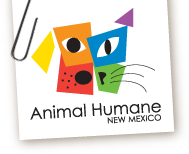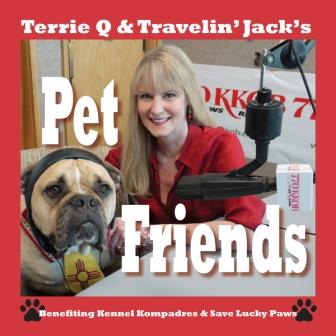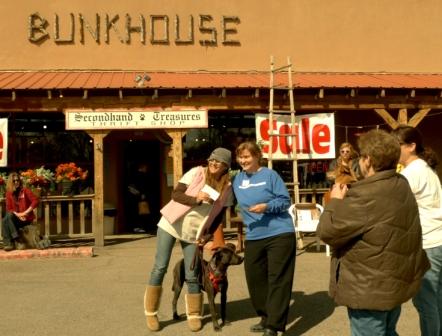A beastly conundrum
Corrales Animal Control would like to give a shout-out to the many groups and individuals who stepped in to help with an unprecedented crisis that began early this year. Twenty-four animals were taken into protective custody when their owner was institutionalized and unable to continue caring for them. CARMA found temporary shelter for most of the animals—19 cats, five dogs, and an alpaca—while Village Mercantile donated 400 pounds of feed, Southwest Animal Rescue Fund provided funding for veterinary care, and both Acequia Animal Hospital and Southwest Veterinary Clinic provided veterinary services.
Animal Control would also like to thank veterinarians Susan Larson and Marcos Gutierrez, and volunteers from throughout the Village for their support in a difficult time, including Lisa Miller, Andrew Burr, Dr. and Judy Fitzpatrick, Ronnie, and the staff and volunteer dog walkers at Corrales Kennels.
Bill Woldman, president of FOCAS(Friends of Corrales Animal Shelter), who assisted in the case, says it underscores the urgent need for Corrales to build a municipal shelter for homeless animals. Rescue groups in the Village already have their resources stretched under ordinary circumstances; Animal Control alone had four dogs and four puppies awaiting homes as of March.
On a brighter note, the Village Council is considering an ordinance banning the chaining of dogs in the Village, modeled on the law passed recently in Bernalillo County. The ordinance prohibits not just the use of metal chains but any “stationary tether” used to attach a dog to any structure or object.
A fresh challenge

Animal Humane New Mexico, the state’s largest private animal rescue, is no longer accepting walk-in animal surrenders, but requiring appointments in advance. The policy change comes on the heels of a major renovation of its headquarters and the closing of its Corrales adoption center.
Executive Director Peggy Weigle says this policy, known as managed admissions, has worked at leading animal shelters across the country. It leads to decreased euthanasia, increased adoptions, and decreased owner surrenders by allowing shelter resources to be allocated more efficiently, she said.
Communities using admissions by appointment have not seen increased abandonment of animals, Weigle added, because people who “dump” animals are not the ones affected by the policy. Public shelters do not typically see increases either, except occasionally at the start.
“People realize that if you want to bring your pet to this high-adoption facility, you’re going to have to make an appointment,” Weigle said. “It’s getting owners to take more responsibility for re-homing their pet.”
During the renovation of its dog kennels, Animal Humane will lose a third of its available dog housing, which is another reason for implementing the policy now, Weigle noted. “When we get overloaded, we cannot do all the extra behavioral training, we’re spread too thin, and those animals end up in our care too long. This is specifically to avoid that happening—it’s matching resources we have to pets.”
Animal Humane is confident the policy will free up resources enough to allow the transfer of hundreds more animals from high-euthanasia shelters. Last year Animal Humane took in nearly 900 at-risk animals from overcrowded rural shelters around New Mexico.
An FAQ about the new policy is posted at the website.

Creative fundraising
Art and animals have always gone together, so it makes sense that artists and writers around Albuquerque have been turning their creativity to animal fundraising.
Pumpkin Cary, whose colorful glazed murals and tiles brighten the walls of Animal Humane headquarters, veterinary hospitals, and countless private homes, has published two coloring books whose proceeds go to Animal Humane. Created by her son, Tristian Fernandez, Pet Portraits: Big Heads Vol. 1 reproduces the best of her hundreds of dog breed drawings. Volume 2 is due out soon, with 34 more breeds.
“I have enough drawings for 24 coloring books alone, and my son wants me to draw one of just mixed breeds,” says Cary, whose easy demeanor belies the superhuman energy behind her hundreds of murals, commissions, etchings, and tiles—every one of them featuring animals she has known personally, she notes.
The coloring books are available on Amazon.
* * *

Since he was adopted by Albuquerque travel writer Jill Lane four years ago, Travelin’ Jack the bulldog has taken to the airwaves with a slew of promotions related to pet-friendly travel around the state.
The unflappable bulldog has put his adorable English mug on all manner of marketing vehicles, a significant portion of which benefits animal causes. Jack writes a “dog travelogue” blog, published a kids’ coloring book, appears regularly on “New Mexico Style” on KASA-TV and on Terrie Q. Sayre’s weekend show on KKOB, radio ran for Dog Governor, and has appeared in countless magazine stories, commercial spots, local promotions, parades—you name it.
The latest entry in the Jack franchise is a pet book that raises money for Kennel Kompadres and Save Lucky Paws. People sent in photos for $5, the best of which were chosen for Pet Friends to appear with such local celebrities as Gov. Susana Martinez, Albuquerque Mayor Richard Berry, author Rudolfo Anaya—all with dog, of course.
Terrie Q. will appear with Jack and Jill at the book launch, May 11-12 at the Southwest Book Fiesta at the Albuquerque Convention Center. Jack will also be signing books May 29 at Bookworks on Rio Grande.
* * *
Photographer Mary J. Mann, known for her studio portraits of babies, families, and pets, annually devotes a share of her profits in the month of February to help animals. This year she found the perfect opportunity when Watermelon Mountain Ranch suffered a break-in and lost 2,000 pounds of dog food just as they were close to running out.
“I am fond of them,” she says of the rescue where she got her coonhound companion Jimmy five years ago. Customers bringing in 10 pounds of dog food and $5 got a 30-minute photography session with 5 × 7 portrait. Mann says she was able to donate more than 300 pounds of dog food, and is offering an ongoing deal: Bring pet food to donate, and she’ll waive the $20 pet fee. Details are here.

* * *
Thrift stores that support animal causes also are growing in popularity, but no one could have guessed at the runaway success of Secondhand Treasures thrift store in Corrales, subtly renamed this year.
Opened in 2011 by Second Chance Animal Rescue to support its rescue operations, the thrift store raised so much money—more than $120,000 in two years—that it incorporated as the separate nonprofit Southwest Animal Rescue Fund. It now supports multiple groups, including Corrales Animal Control, New Mexico Dogs Deserve Better, Bro & Tracy, Paws & Claws in Artesia, and a rescue group in Gallup working on the Navajo reservation.
“It was decided that operating the store separately from the rescue side would give store management the control they needed to continue to thrive and grow,” said Second Chance director Debbie Duck.
The thrift store celebrated its second anniversary with a party and sale on March 10, donating proceeds from the day to three rescue groups. Adoptions held in the parking lot found new homes for some half dozen dogs.
To celebrate its second anniversary, Secondhand Treasures Thirft Shop handed out checks to local animal-rescue groups at a party and sale in March.
